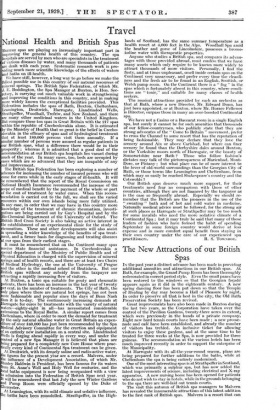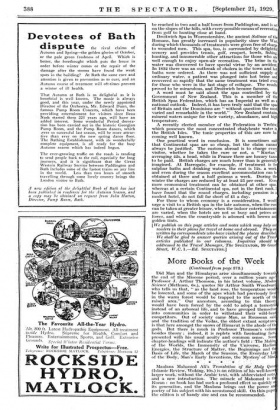The New Attractions of our British Spas
IN the past year a distinct advance has been made in providing additional amenities and attractions in our British spas. At Bath, for example, the Grand Pump Room has been thoroughly redecorated in correct period style. Even the small panes have been restored to the windows so that the Georgian facadd appears again as it did in the eighteenth century. A new spring dancing floor has been put down so that the Temple of Healing by day may become a Hall of Pleasure by night. In order to preserve all that is best in the city, the Old Bath Preservation Society has been revived.
Great improvements have also been made in Buxton during the last two years, as the Corporation have taken over the control of the Pavilion Gardens, twenty-three acres in extent; which were previously in the hands of a private company. Eight new hard tennis courts have been made ' • a new prome- nade and café have been established, and already the number of visitors has trebled. An inclusive ticket for allowing visitors to enjoy these gardens, and at the same time to be treated for three weeks at the Spa, is now provided for three guineas. The accommodation at the various hotels has been much improved recently in order to support the enterprise of the Municipality.
At Harrogate with its all-the-year-round season, plans are being prepared for further additions to the baths, while at Cheltenham the spa is being entirely modernized. One of the most interesting spas is at Strathpeffer in Scotland, which was primarily a sulphur spa, but has now added the latest improvements of science, including electrical and X-ray apparatus. A new nursing home has been opened for patients who do not wish to stay in hotels, while in the grounds belonging to the spa there are well-laid out tennis courts.
The visit this autumn of British spa managers to Malvern has revealed the innumerable attractions of this latest addition to the first rank of British spas. Malvern is a resort that can be reached in two and a half hours from Paddington, and is set on the slopes of the hills, with every possible means of recreation from golf to hunting close at hand.
Droitwich Spa in Worcestershire, the ancient -Salinas of the Romans, has greatly increased in popularity since the War, during which thousands of treatments were given free of charge to wounded men. This spa, too, is surrounded by delightful scenery and provides tennis, golf, croquet, bowls, fishing, hunting, and innumerable other attractions for those who are well enough to enjoy open-air recreation. The brine in the water was discovered to have special virtue by an accident. In 1832 there was an outbreak of cholera in the town and hot baths were ordered. As there was not sufficient supply of ordinary water, a patient was plunged into hot brine and recovered so rapidly that the same treatment was tried even for those who were in the last stage of collapse. The results proved to be miraculous, and Droitwich became famous.
A word must be said about the spas controlled by the Government of New Zealand. This is a member of the British Spas Federation, which has an Imperial as well as a national outlook. Indeed, it has been truly said that the spas of Britain and the Dominions are " without question the most varied and remarkable in the world." New Zealand contains mineral waters unique for their variety, abundance; and high temperature.
A recently elected member of the Federation is Trefriw, which possesses the most concentrated chalybeate water in the British Isles. The tonic properties of this are now be. coming well known.
One practical word in conclusion. It is sometimes said that Continental spas are so cheap, but the claim cannot always be justified. The custom abroad is to charge every visitor, whether he takes the cure or not, a " Kurtax ' averaging 42s. a head, while in France there are luxury taxes to be paid. British charges are much lower than is generally imagined. At Harrogate, for example, if treatment is for sulphur baths and drinking waters, the cost is 12s. a week, and even during the season excellent accommodation can be obtained at three and a half guineas a week. During the winter the charges are reduced by at least 25 per cent. Even more economical treatment can be obtained at other spas, whereas at a certain Continental spa, not in the first rank, I have found that the round charges, including pension in a modest hotel, do not fall far short of £1 a day.
For those to whom economy is a consideration, I would urge a visit to a British spa in the late autumn, when the curt can be taken at greater leisure, when the indoor entertainments are varied, when the hotels are not so busy and prices a lower, and when the countryside is adorned with brown and golden tints.
[We publish on this page articles and notes which may help ou readers in their plans for travel at home and abroad. They are
• written by correspondents who have visited the places described. We shall be glad to answer queries arising out of the Teat articles published in our columns. Inquiries should addressed to the Tiavel Manager,- The SPECTATOR; 99 auc













































 Previous page
Previous page